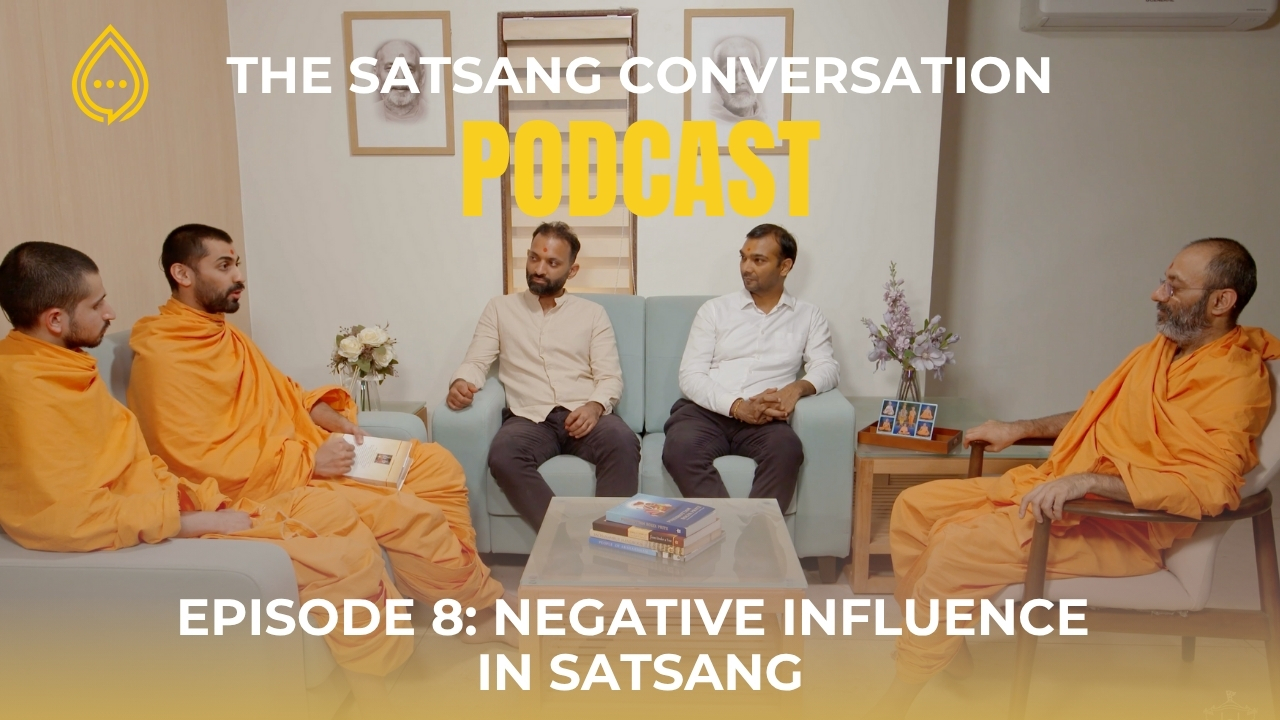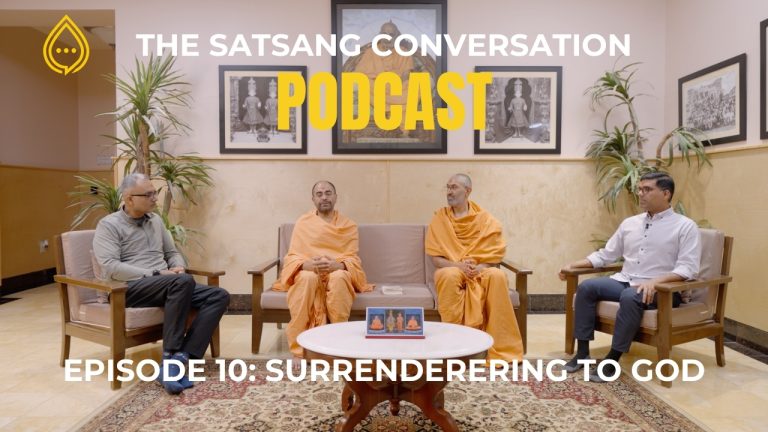The Power of Your Words: Eliminating Spiritual Negativity
In our spiritual journeys, we often focus on grand philosophies, deep meditation, and complex rituals. Yet, sometimes the most profound transformations begin with something as simple as the words we choose to speak. Within the sacred fellowship of satsang, our speech can either build a fortress of faith or silently corrode its very foundations. This is the urgent, timeless message Shriji Maharaj delivered in the Vachanamrut Gadhada I-17, a discourse that serves as both a diagnosis and a cure for a subtle spiritual ailment.
The Paradox of Negativity in Satsang
A Cheerful Proclamation
The Vachanamrut opens with a seemingly routine description. Shriji Maharaj is seated, adorned with flowers, in a cheerful mood as the Shrimad Bhagvat is being read. The atmosphere is serene and joyful. Yet, into this positive environment, Maharaj introduces a jarring concept: kusang (negative influence) within satsang (holy fellowship). This paradox is intentional. It immediately grabs the listener’s attention, forcing them to confront a uncomfortable truth: even in the most sacred spaces, spiritual complacency can take root.
“In our Satsang Fellowship, a small element of negative influence remains, which I wish to eliminate today.”
This statement is revolutionary. Maharaj doesn’t say “your” satsang, but “our” satsang, establishing a collective ownership and shared responsibility. The urgency is palpable—”I wish to eliminate today.” This isn’t a problem to be addressed eventually; it is a spiritual emergency requiring immediate action from paramhansas, sānkhya-yogis, and karma-yogis alike.
The Anatomy of Discouraging Talk
So, what does this “negative influence” actually sound like? Maharaj gives it a voice. It is the voice of spiritual compromise that says, “Who can follow God’s commands thoroughly? Who can possibly observe the religious vows perfectly? No one.” This is the language of self-justification, the internal monologue that excuses our lack of effort by claiming the goal is unattainable for anyone.
This mindset doesn’t just remain internal; it spills over into our conversations with others, becoming a form of spiritual sabotage. We might dismiss rigorous spiritual practice as “overkill” or joke about the impossibility of true devotion, all for a quick laugh or to soothe our own ego. As one speaker in the conversation noted:
“We take sometimes concessions from ourselves… That kind of complacency Maharaj is talking about.”
This is the core of the problem: a lethargy of the spirit that justifies its own stagnation and, worse, actively discourages others from striving higher.
The Deeper Roots and Damaging Effects
The Ego and Ownership
Why do we engage in such negative talk? Often, it stems from ego. When we find ourselves unable to meet a spiritual standard, our ego feels threatened. To protect it, we may try to lower the standards for everyone, dragging others down to our level to avoid feeling inadequate. This is the opposite of taking “ownership” of our satsang.
When we truly own something, we take responsibility for its well-being. If we see a problem, we feel compelled to fix it. Maharaj’s use of “our satsang” is an invitation to this higher level of responsibility. Are we owners of this spiritual fellowship, or are we merely tenants, complaining about the fixtures but doing nothing to maintain them?
The Ripple Effect of a Single Word
The damage caused by discouraging words is profound. A single negative comment can wash away years of a Satpurush’s effort to inspire someone. The conversation highlighted a powerful example: after Yogiji Maharaj spent hours encouraging two parshads to engage in seva, a single sarcastic “welcome” when they finally showed up was enough to make them turn back.
“You just washed away Yogi Bapa’s effort. This is the Satpurush’s effort… one comment and we’re going against Bapa.”
This illustrates the immense spiritual weight our words carry. We are not just speaking into a vacuum; we are interacting with souls on a delicate journey. A moment of wit for us can be a major derailment for someone else. Maharaj goes so far as to label those who persistently speak this way as “impotent” (napusank)—spiritually sterile, incapable of producing any positive fruit in themselves or others.
Cultivating a Culture of Courageous Speech
The Antidote: Effort Over Outcome
Maharaj’s solution is not a demand for instant perfection, but a call for sincere, persistent effort. The spiritual path is not about never falling; it’s about always getting back up. The analogy of a learning baby is perfect: when a toddler falls while learning to walk, the parents don’t scowl in disappointment; they smile and encourage them to try again. They see not the fall, but the effort and the future potential.
“Maharaj is okay with me failing. But am I trying? That’s what he’s looking for.”
In Vachanamrut Gadhada I-5, Maharaj assures that even if one strives to behold God’s form for a hundred years without success, God is pleased simply by the unwavering effort. Our focus must shift from the elusive “result” to the excellence of our endeavor. It is the quality and sincerity of our effort that attracts divine grace, not a perfectly checked box.
Practical Steps for a Positive Mindset
How do we practically implement this? Maharaj prescribes a tangible corrective action: if one finds themselves uttering such discouraging words, they should observe a fast. This isn’t merely a punishment; it’s a tool for awareness. It forces us to pause and reflect on the power of our speech and its impact on our spiritual ecosystem.
Furthermore, we must learn to filter our words through the lens of the timeless maxim from Swamini Vato:
“Satya, hit, ane priya.” — Is it true? Is it beneficial? Is it loving?
Before speaking, especially about spiritual matters, we must ask: Will these words help my spiritual journey or someone else’s? Will they strengthen our collective attachment to the Satpurush and the satsang? If the answer is no, then they are not worth uttering.
The Collective Ascent
Ultimately, this Vachanamrut is about building a unified, positive culture. Gunatitanand Swami’s analogy of the arrows is telling: a single arrow is easily broken, but a bundle of arrows is unbreakable. When we are united in a positive, striving mindset, we become spiritually resilient. When we allow negativity to splinter us, we become weak and vulnerable.
The modern-day example of Mahant Swami Maharaj inspiring over 37,000 children to memorize the entire Satsang Diksha by the age of five shows the power of positive, courageous speech. What seemed impossible became achievable because the leadership expressed unwavering belief in the devotee’s potential.
Conclusion: Your Words, Your Spiritual Legacy
The message of Gadhada I-17 is a profound reminder that spirituality is not a passive inheritance but an active construction. The fellowship of satsang is built and maintained one word at a time. We are all shareholders in this divine enterprise, and the cultural tone is set by our collective conversation.
Let us therefore make a conscious choice, starting today, to eliminate the subtle negativity that discourages and disheartens. Let our speech be courageous, our mindset positive, and our efforts sincere. Let us be the reason someone feels empowered to take one more step on their spiritual path, not the reason they turn back. For in the end, the words we speak in the hallways of the mandir and the conversations we have with our fellow devotees are not just comments; they are the very bricks and mortar with which we build our journey to Akshardham.
Check out the Vachanamrut text here (Gadhada Section 1-17): https://anirdesh.com/vachanamrut/index.php?format=en&vachno=17
Location: BAPS Shri Swaminarayan Mandir, Ahmedabad (https://www.baps.org/Global-Network/India/Ahmedabad.aspx)














+ There are no comments
Add yours